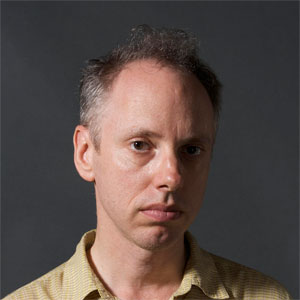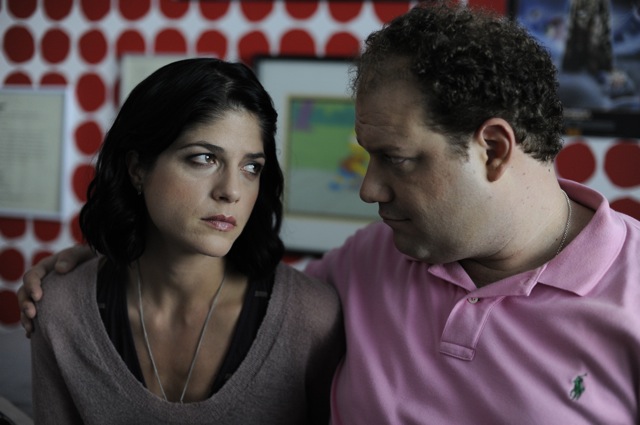Fuse Film Review: Running as a “Dark Horse” in the American Cinema
Todd Solondz’s lack of commercial appeal as a filmmaker is understandable. His movies deal overtly with some of the most uncomfortable aspects of American life.
By Tim Jackson.
When the idiosyncratic director Todd Solondz was interviewed by John Waters at the 2010 Provincetown Film Festival, there was a bit of a disconnect. These two creative sensibilities would seem to be a perfect match, yet Solondz seemed uneasy. Waters’s ironic sensibility, which both savors and lampoons the dirty little corners of American life, disconcerted Solondz. It became obvious that irony was not a common ground for these filmmakers—the kind of irony that Waters finds amusing, Solondz finds wanting. As the organizers and patrons of the festival heaped on the accolades and the speeches went on about the importance of his work and why Solondz was this year’s P-Town “Director on the Edge,” Solondz appeared to sink down deeper and deeper into his easy chair.
That tragicomic moment says a lot about Solondz. He doesn’t care to draw a line between comedy and tragedy. In fact, it is not a distinction he even tries to understand. He is not a jovial ringmaster appreciating the antics of his subjects with a sardonic eye. When I saw him the following year at the Independent Film Festival of Boston, I told him that my wife, a psychotherapist, couldn’t sit through his 1998 film Happiness; it was too real, too damaged—troubling, not funny. In contrast, during a screening of that film’s recast, re-imagined sequel, 2009’s Life During Wartime, the woman next to me was in constant hysterics. I asked Solondz after the screening about these contradictory reactions. “I’m lucky that I even get to make movies,” the director replied in his nasally, New York accent. “I start to write one thing and this is what comes out. It’s OK that people don’t like it or that people laugh. Sometimes I think the laughter is inappropriate, but this is what life is like, don’t you think? You can’t just do one thing. Everybody is coming from such a different place.”
Dark Horse, Solondz’ latest journey into family dysfunction and broken dreams, played for one week in Boston. Like Palindromes, which also played for a single week in Harvard Square, the movie is many things: puzzle, satire, commentary, comedy, and a disconcerting portrait of American self-entitlement and emotional indulgence. It should have received a lengthier reception.
Abe (Jordon Gelber) is a rotund man-child, the “dark horse” of the family. His brother is a doctor, and his dreary parents Jackie and Phyllis (Christopher Walken and Mia Farrow), work all day, come home, plop down on the couch, and stare blankly at an unseen TV. They appear to live without an interesting bone in their exhausted bodies. These two amazing actors, adorned with some truly hideous hairstyles, turn stillness into poetry.
The film begins amidst the jubilant dancing at a Jewish wedding. The camera pans slowly left to reveal Abe and Miranda (Selma Blair), the only two at the party still seated, both staring blankly. In the film’s first line, Abe says, “I never dance. It’s not my thing.”
Abe asks Miranda for her phone number, and haltingly, almost by accident, she gives it to him. As Miranda, Blair riffs on the emotionally drained character she played in Solondz’s 2001 film Storytelling. In both movies she is an aspiring writer, but here she is older, less hopeful, dazed and, we presume, medicated. Abe works (or avoids working) as an accountant for his father’s small, anonymous firm. He passionately collects action figures and has the emotional control of a 12 year old; he’s easy and eloquent one minute, throwing a temper tantrum the next. It’s as though Pee Wee Herman landed in a grown-up movie. Everything he says is funny, seemingly ingenuous, but disturbing because he is so clueless, his opinions alarmingly trite.
On their first meeting, he asks Miranda to marry him. “There was a time when I thought I’d just give up on hope, ambition, success, self-respect, and get married and have children,” she says. But soon, she’s actually considering the proposal. Miranda has only one question for Abe: “Are you real, and you’re not being ironic like performance art or something? I want to want you, and that’s enough for me.” Solondz repeatedly brings up the notion of irony and sincerity. He wants us to understand that he takes the damaged and numbed lives of his characters seriously.
Despite what it sounds like, the film is not really depressing, nor is it any more sentimental than his previous films. Jordon Gelber, an experienced theater actor, has found a way to play Abe, a unpleasant, often unsympathetic character, with such commitment and grace that you never feel pandered to. There is no sense he is manipulating the viewer for the sake of a gag or to score pathos. Solondz is always masterful with his casting choices, finding performers that make his satires on the American family both compelling and scathing. What’s more, the director doesn’t let himself off the hook. His films, beginning with Welcome to the Dollhouse, are full of his own insecurities and obsessions. Solondz is as much the “dark horse” as Abe. Fear lies at the root of creating and then selling art. Solondz’s own anxieties about sexuality are also a constant, revolving around how one defines and finds love in an age that encourages prolonged adolescence in a society where money defines success.
In addition to what I have said above, Dark Horse also examines the dreams and insecurities of the writing process. Solondz ensures that his actors savor his language: they skillfully play the pauses and deftly navigate abrupt shifts of mood and tempo. He writes theatrical dialogue, evoking a linguistic absurdity reminiscent of Edward Albee’s Zoo Story, dissecting the broken family in ways that resemble Harold Pinter and Sam Shepard. His silences and rambling story lines also remind me of the wonderful, young playwright Annie Baker, specifically her play Aliens.
There are other directors who work in the slightly unreal territory staked out by Solondz. Luis Buñuel and David Lynch come to mind. There are some delicious Eraserhead (Lynch’s early underground hit) type moments in Dark Horse where everyone sits looking at one another in awkward and lethal silence. As in the films of Buñuel, there is a childish surface simplicity to a story that in its depths holds the razor of satire. Bunuel’s films, Dark Horse and the astonishing Pallindromes, also veer into realms of the Dadaesque. In Bunuel’s Obscure Object of Desire, Conchita was played by two different actresses; in Pallindromes, Aviva is played by five actresses of entirely different ages and races. In Dark Horse, we are unsure at times if what we are seeing is real or a dream. In a split second, Abe’s father’s secretary at the firm, Marie, (played by the underrated and wonderful Donna Murphy) suddenly transforms from Abe’s guardian angel into an unrepentant cougar. Is this metamorphosis triggered by Abe’s sexual anxiety, Marie’s wish fulfillment, a nightmare, hallucination, or a daydream? The ending gives the viewer a hint, but as in Bunuel’s Belle de Jour, or any Lynch film, the deviltry of art lies in trying to figure out the details.
Solondz’s lack of commercial appeal as a filmmaker is understandable. His movies deal overtly with some of the most uncomfortable aspects of American life: race relations, male identity, child abuse, dysfunctional families, the impossibility of love, guilty parents, damaged kids, abortion, lost desire, and dashed dreams. He doesn’t temper his portraits with irony, as does Waters, but faces himself and society’s problems head on. We don’t know whether to laugh or cry, which limits his commercial appeal considerably—audiences don’t like to be made to squirm in their seats. His films demand that we find the humor inside the pain and empathize with people that initially we want to laugh at. But movies should be about more than mindless escape-fests: Dark Horse and Solondz’s other films are right to demand more. Like other great satiric surrealists, the pleasure lies in trying to get your emotional bearings in the askew worlds that Solondz creates.




Classy comprehensive review which will a,) cause me to see this film and
b) cause me to see his other films. Only problem. As an adopted New Yorker, what is diss about our “nasally speech?” We don’t be talking diss way in da Bronx.
Norm: I’m glad it piqued your curiosity. I meant Solondz has a strong New York accent and a signature nasally voice, not that all New Yorkers have inherently nasally speech. I meant no affront. New Yorkers so awfully self-conscious! Not all, of course.
Nice thoughtful review about a tough subject. Love the contrast/comparisons to Waters and the other directors.